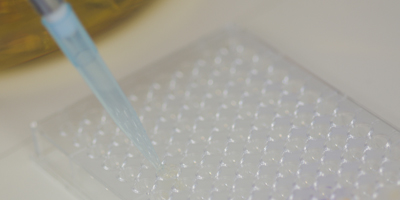96-well Plate Recommendations
You are free to send us your samples in any standard 96 well plate of your choice. However, please note that it must be a standard 96 well plate containing 12 columns of 8 wells. Please ensure it is clear which corner is the "A1" well.
When sealing the top of the plate, there are various methods you can use such as heat sealing, adhesive film or a silicon sealing mat. We recommend only using a silicon mat as in our experience adhesive film does not stick well and can result in leakage out of wells; moreover heat sealing is difficult for us to remove in order to access the samples. For customers wishing to use silicon mats, we recommend mats from Elkay Labs. The ones we use have product code "MAT-PCR-96". We will return mats in batches to customers for re-use. If using these mats, we recommend VWR 96 well half skirted plates (732-2390). The combination of mat and plate provide a very good seal and there should be no leakage of contents.
For those customers who only require a small number of plates/mats and do not wish to buy entire boxes of both, please contact us and we will supply you with the number of plates/mats you need at £10 per plate (including postage & packing) along with a protective base plate and a silicon sealing mat to keep your samples in the wells when you return the plate together with your samples.
Organization of Samples on Plate
You may send either 48 or 96 samples per plate. If you send less than 48 or 96 samples, you will be charged for the full 48 or 96 samples. Please organize the samples into the wells in the format given below. Failure to do this will result in the samples not being processed. Please ensure that you know where each of your samples is on the plate, since result files will be numbered as illustrated below (i.e. consecutively from 1...48 or 1...96).

Please note the cut corner on the plate (upper right) and the reference numbers/letters that will also appear on the microtitre plate. Please ensure that your samples are placed exactly as per the illustrations above or you will not receive your samples back in the correct order. Once all your samples are ready, seal the plate and send to us.
As above, please contact us if you want us to supply you with a plate/mat for the samples.
Result File Labeling
Results files for 96 well plate sequencing are labeled according to sample number (as shown in the plate image above). Samples have the following format "Sample number_Capillary number". For example "01_008". This is sample "1" and is located in well A1 of the plate. Sample 2 would be "02_007", etc. We include the capillary number in the name of the sample result file since it helps us if there are issues with samples.
Read Length
There are many factors that can affect the read length one obtains. Our facility will endeavour to provide customers with the longest read possible depending on service requested. Our new ABI 3730 sequencer uses the latest technology and provides really excellent results.
With a template of appropriate quality, customers can expect read lengths of up to 1000 bases of sequence from a single primer when sequencing standard templates (<20kb). For other types of template (especially for large templates), read lengths can decrease to issues of template quality and quantity. If you have problems achieving good read lengths with high quality template, please take a look at our resources section. If you still need more help, please feel free to contact us.
 Many customers have a significant number of templates to examine simultaneously and have the ability to provide these in a 96-well format.
Many customers have a significant number of templates to examine simultaneously and have the ability to provide these in a 96-well format. 

